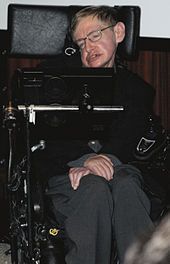
The famed cosmologist and physicist Stephen Hawking gave a lecture entitled "The Origin of the Universe" at the California Institute of Technology on Tuesday night in which he said the universe did not need God to come into existence. Hawking is widely admired for his scientific excellence and his zeal in introducing debates among cosmologists and physicists to a popular audience, putting ideas what can sometimes seem impenetrable in language more easily understood by the layman. The scientist is also a high-profile sufferer of a neurological disorder called amyotrophic lateral sclerosis, or Lou Gehrig's Disease, which has left him almost entirely paralyzed.
"What was God doing before the divine creation?" Hawking joked to an audience of several thousand. "Was he preparing Hell for people who asked such questions?"
He also made light of the distaste of a particular religious authority - Pope John Paul II - for scientific explanations of the universe's origins, noting that the Pope had admonished scientists against studying the moment of creation around the same time that Hawking released a paper discussing just that topic. The Catholic Church considers the topic sacred and thus beyond the reach of scientific discussion.
"I was glad not to be thrown into an inquisition," Hawking joked.
The talk began with a retelling of an African creation myth before Hawking went on to outline a number of scientific and theological explanations about how the universe was created, including Fred Hoyle and Thomas Gold's steady state theory, which hypothesizes that the cosmos has no beginning and no end and that galaxies form continuously from spontaneously created matter. Hawking cited recent observations by telescopes and other cosmological instruments in pointing out the inadequacy of this theory.
Hawking laid out the fundamentals of "M-theory", which is founded in part upon the ideas of Richard Feynman, another famed physicist, and which Hawking believes to be the only big idea which adequately explains what he has observed. M-theory hypothesizes that multiple universes are created out of nothing, according to Hawkins, with many possible histories and many possible states of existence.
He closed his lecture by advocating for the continued exploration and colonization of space, saying it was necessary for the future of humanity. "I don't think we will survive another 1,000 years without escaping our fragile planet," he said, citing the risk of self-annihilation through war or accidents, or a cosmic catastrophe like an asteroid strike.
"It has been a glorious time to be alive and doing research in theoretical physics," Hawking said. "Our picture of the universe has significantly changed in the past 50 years and I'm happy if I've made a small contribution."
© 2025 Latin Times. All rights reserved. Do not reproduce without permission.




